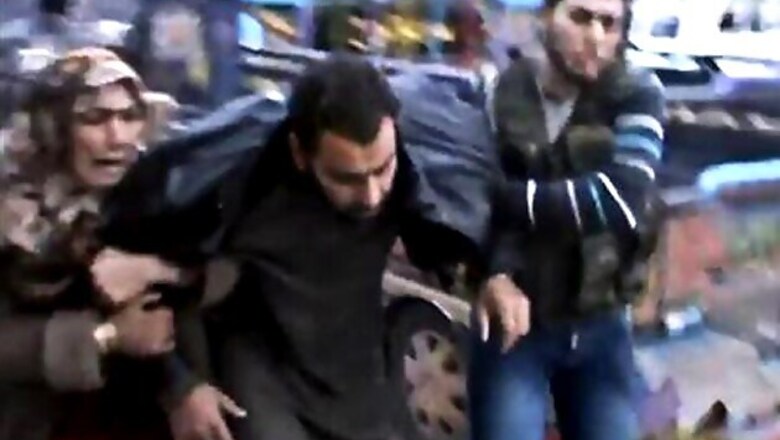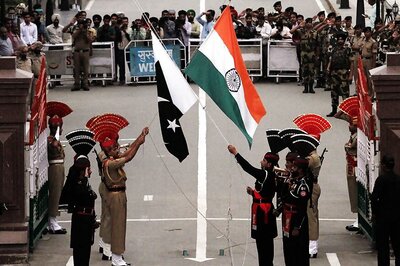
views
Beirut: Syrian rebels fully captured a northern town near the Turkish border on December 25 after weeks of heavy fighting and attacked a regime air base in a neighboring province, activists said. The air base is in Aleppo province, where opposition fighters have already captured three other large military bases in recent months. Rebels have also laid siege to the international airport in the city of Aleppo, Syria's commercial capital, and launched an offensive on the police academy near the city.
With steady rebel gains across the north, President Bashar Assad's regime is having increasing difficulty sending supplies by land to Aleppo province, especially after rebels cut a major thoroughfare from Damascus. It is just another sign that the opposition is consolidating its grip across large swathes of territory in northern Syria near the Turkish border.
In his traditional Christmas address, Pope Benedict XVI decried the slaughter of the "defenseless" in Syria, where anti-regime activists estimate more than 40,000 have died in fighting since the uprising against President Bashar Assad's rule began in March 2011.
In another blow to the regime, activists said that Mohammed Adnan Arabo, a member of Syria's parliament has left the country and joined the opposition. Ahmad Ramadan, an executive council member of the opposition Syrian National Council group, and other activists said Arabo arrived in Turkey on December 25. He said the regime's hold on power is deteriorating and rebels are besieging military bases for weeks until they either take over or negotiate with local army commanders to surrender. He added that some regime forces are being diverted to the capital to fight there.
"The regime cannot protect its bases and also cannot send forces to support troops under siege," he said. Over the weeks, rebels fighting to overthrow Assad have also been able to take the battles into the capital Damascus, Assad's seat of power, where the southern neighborhoods are witnessing almost daily clashes between troops and rebels.
The big successes began in mid-November, when rebels captured Aleppo's Regiment 46, a large military base, carting off tanks, armored vehicles and truck-loads of munitions. Three weeks later, they captured the Sheik Suleiman base near the provincial capital of Aleppo and days later they took an infantry base in the city.
Last week, they captured an army technical regiment near Damascus' international airport but were pushed back in a counter attack. The army command said in a statement that the regiment's commander was killed in the battle. The rebels have also brought the battle to areas around Damascus international airport where some flights were cancelled earlier this month because of the intensity of the fighting.
One of the biggest blows came in Damascus on December 12 when a suicide attacker blew his vehicle outside the Interior Ministry, killing five and wounding many, including Interior Minister Mohammed al-Shaar. The government denied at first that al-Shaar had been wounded until it got out when he was brought last week to a Beirut hospital for treatment.
It was the second injury the minister suffered after being wounded in a July 17, bomb inside a high-level crisis meeting in Damascus that killed four top regime officials, including Assad's brother-in-law and the defense minister. The rebel takeover of Harem, a town of 20,000 in northern Idlib province, was the latest in a string of recent rebel successes.
The Britain-based Syrian Observatory for Human Rights said the rebels captured Harem in the early hours of December 25. Mohammed Kanaan, an Idlib-based activist, said the last post to be taken was the historic citadel, which overlooked the town. The army had turned the citadel into a military post.
"Harem is fully liberated now," Kanaan said via Skype. He added that as the rebels pounded army posts and checkpoints in Harem, the troops withdrew to the citadel that later fell in the hands of rebels. Rami-Abdul-Rahman, who heads to Observatory, said nearly 30 soldiers and pro-government gunmen surrendered late Monday. He added that rebels set free all gunmen at the age of 16 or less and referred others to local tribunals.
"Harem was very important because it is one of the towns that was loyal to the regime," Abdul-Rahman said by telephone about the town that is nearly a mile from the Turkish border.
In Aleppo province, which neighbors Idlib, local activist Mohammed Saeed said rebels attacked the air base in the town of Mannagh near the Turkish border. He said it is one of four air bases in the province, adding that rebels also attacked the police academy near the city of Aleppo.
Regime forces have been using helicopters to carry supplies to besieged areas and to attack rebel positions. The regime has had increasing difficulty sending supplies by land to Aleppo province after rebels captured in October the strategic town Maaret al-Numan. The town is on the highway that links Damascus with Aleppo, Syria's largest city and a major battleground in the civil war since July.
"Airplanes and helicopters are the only way to send supplies since the Free Syrian Army controls the land," Saeed said. He added that rebels are also laying a siege to Aleppo's international airport known as Nairab and threatening to shoot down military or civilians planes using it.
In the Damascus suburb of Jaramana, opposition gunmen ambushed the head of military intelligence in the area and seriously wounded him. He later died of his wounds, the Observatory said. Elsewhere in Syria, the Observatory reported violence in areas including the eastern province of Deir el-Zour, the southern area of Quneitra on the edge of the Israeli-occupied Golan Height and the southern region of Daraa.
In Israel, top officials said they cannot corroborate Syrian activists' claims that the regime has used chemical weapons against its citizens. Vice Premier Moshe Yaalon told Army Radio that Israel has "no confirmation or proof" the regime has employed such weapons in the civil war. He says Israel is "monitoring the situation with concern."
Defense Ministry official Amos Gilad told Israel Radio that Syria was closely guarding its chemical weapons stockpiles.
On December 24, the Observatory quoted activists in the central city of Homs as saying that six rebels died in two neighborhoods the day before after inhaling white smoke that came out of shells fired by government troops in the area. Amateur videos released by activists showed men in hospital beds suffering breathing problems as doctors placed oxygen masks over their faces.




















Comments
0 comment